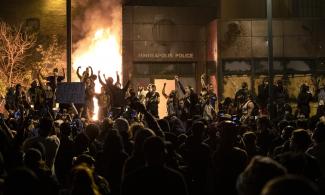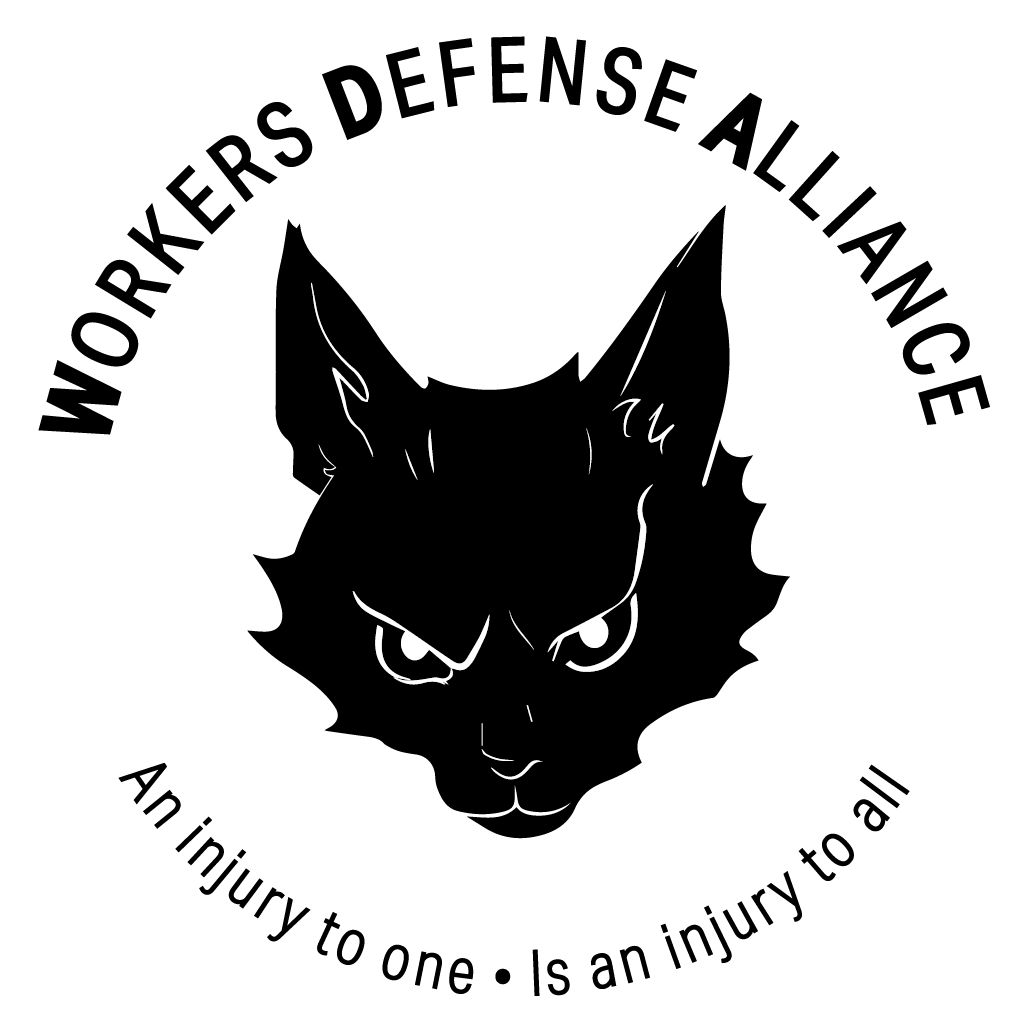
The heroic Minneapolis Uprising, provoked by the public lynching of George Floyd, has shaken the entire world. Things that seemed impossible just a couple months ago, are now openly discussed and debated at all levels of society.
A prime example is the slogan “Abolish the Police” - which arose with the flames and smoke from the militant protests on Lake Street. “Abolish the Police” was the major, defining slogan of the Uprising. It served as a marker of how radical and defiant the movement had become - and how unwilling the young people were to accept the usual kind words and crumbs from the politicians.
The role of police in society should be clear - it is to protect the rich and powerful and preserve the status quo. This is why Black police chiefs, training programs, and civilian oversight have never made a real difference - the underlying purpose of the police is still the same. When you know the history of the police in the United States, from the Slave Patrols to the deputized thugs who harassed and intimidated the immigrant working-class, to today’s riot police and assassins - it all starts to makes sense. The Minneapolis Police Department (MPD) is not on our side and never could be. We should focus on building the capacity of working-class communities to resist the police and defend our neighborhoods - not tweak the existing repressive apparatus.
The Workers Defense Alliance supports the slogan “Abolish the Police”. Our predecessor organization, the General Defense Committee (GDC) - and also our comrades in the former IWW African Peoples Caucus - both raised this slogan in the militant protest movements for Justice for Jamar Clark and Philando Castile over 4 years ago.
We promoted abolition as part of our approach of building both militant street resistance to police brutality and organizing “working-class defense groups” to help communities protect themselves from the police and anti-social community violence. For us, the slogan helped explain the role of the police in our society and the folly of trying to reform it into something better. We did not propose “Abolish the Police” as a legislative measure to go lobby liberal politicians, but as the result of the revolutionary struggle of the working-class.
Reformist Abolition?
Since the struggles around Jamar and Philando, other abolitionist groups have become more prominent in the Twin Cities. Some of them, like MPD 150, have produced excellent materials detailing the brutal history of the MPD and inviting the community to envision a world without police. New groups like Black Visions Collective and Reclaim the Block have been effectively challenging the power structure to justify any funding of the murderous MPD. But these new abolitionist groups have also pretty much removed revolution from the equation of how to get rid of the police. Instead of preparing the fighting capacity of the working-class and oppressed communities, the focus is on “organizing the politicians” to defund and (maybe) dismantle the police.
The debate around abolishing the MPD now regrettably centers around the strategy of several Minneapolis City Councilors to amend the city charter and take out the provisions that mandate a police department and a minimum number of cops. They say they want to replace the MPD with a new “public safety department” that would emphasize social services, but still retain a smaller number of law enforcement officers. This new agency would be under great pressure to evolve back into the same kind of repressive apparatus the MPD was. If it couldn’t do that fast enough, the Hennepin County Sheriff and private security forces would start to fill the gap for the power structure.
Clearly this is not the kind of “abolition” that abolitionists and revolutionaries fight for, even if it does show the power of the Uprising to change the debate. Unfortunately, the longer-term community-based and leftwing anti-police brutality groups - all who have made major contributions to the struggle against police murders and violence - are not providing a solid alternative to abolition-lite.
No Alternatives?
The Racial Justice Network, with the NAACP, had a press conference to oppose the charter amendment under the guise of supporting Chief Arradondo - the MPD’s first Black police chief. They argued that Arradondo had not been given enough time to make changes to the department - and insinuated that the MPD was under attack as a *Black-led institution*. Nothing could be further from the truth. It has become standard fare for the system to appoint Black chiefs around the country - and nothing ever changes. That’s because the system is still the system, and the function of the police is still the function of the police. And while Arradondo is smarter, and more charismatic than the local politicians - he is not a good guy. Five people of color have been killed by the MPD during Arradondo’s first three years in power - and he attempted to lie about the cause of George Floyd’s murder, until the video of his death went viral. People are going to have to decide whether they support the Chief or the people - you can’t do both.
Communities United Against Police Brutality (CUAPB) has opposed the charter amendment to eliminate the MPD on the grounds that the replacement proposals are poorly written - but this misses the point entirely. Our emphasis should be on doing as much damage to the white supremacist institution of the MPD as possible - not waiting for some perfect replacement from the politicians. CUAPB’s alternative to abolition is a long list of reforms to the MPD - some might be better than what we have, and some are downright offensive, like suggesting that cops need more sleep so they’ll be less brutal (!). But in either case, this approach ignores the role of the police in our society and tries to return us to a time before the Uprising and the popularity of police abolition.
The Twin Cities Coalition for Justice 4 Jamar (which the GDC used to participate in several years ago) actually organized a lobby campaign to stop the city charter from being amended, thus maintaining the status quo for the MPD (!). They have dressed up this betrayal of the Uprising by arguing that the City Council can’t be trusted, that police can’t be abolished under capitalism, and that what’s really needed is so-called “community-control” of the MPD. This is a thoroughly dishonest and sectarian argument. Of course the City Council can’t be trusted - but that doesn’t mean that the government won’t sometimes concede to popular pressure. For instance, the City Council previously passed a watered-down minimum wage increase in response to the Fight for $15 campaign. Should we have lobbied the City Council not to pass the wage increase because it didn’t go far enough? But the Coalition’s alternative is actually more conservative than the City Council’s plan. The Coalition proposes a Civilian Police Accountability Council (CPAC), modeled after a campaign in Chicago. This campaign’s strategy is to get support from the City Council and/or amend the city charter - the exact same approach they hypocritically criticize when it comes to defund/disband efforts. There was no sentiment in the Uprising for “Community Control” of the police - people know that the various attempts at civilian oversight have all been frauds. CPAC supporters argue this would be different because it would have an elected Board. But why would this Board have any more of a radical character than the City Council elected by the same voters?
CPAC does not get rid of the police or even cut the police department budget. Instead it creates a big new city government bureaucracy that will supposedly hold the police accountable to the community. But if it’s utopian to think the police can be abolished under capitalism, it's equally naive to think the community can exercise “control” over the murderous MPD. Any CPAC bureaucracy with its middle-class staff, attorneys, investigators, and other specialists would actually have a material interest in the continuation of the MPD - not its abolition.
Our Approach
So what should our approach be to the City Council’s maneuvers? First we should avoid getting bogged down in the lobbying at city hall. These efforts are designed to pull activists off the street and into the logic of system-politics. It was the Uprising that put this discussion on the table, not the politicians. Let’s keep our focus on the communities and class that carried out the rebellion. Second, we should aggressively promote the concept of Abolition of the Police - not in a watered-down, reformist way, but in a clearly argued revolutionary framework that includes building up working-class defense organizations and expropriating needed resources from the rich. We should expose attempts to label things “abolition” that are clearly not. We should also get better at discussing and debating the real questions, concerns, and criticisms many people have about abolition of the police. Third, and most importantly, we must push ahead with the building up of working-class defense organizations and other autonomous spheres of working-class power.
